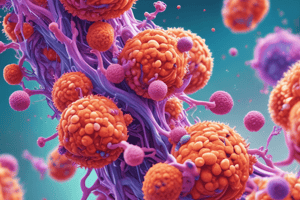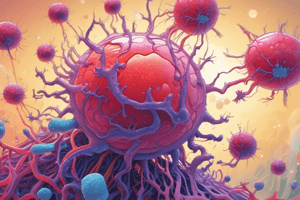Podcast
Questions and Answers
What role do helper T cells play in the immune response?
What role do helper T cells play in the immune response?
- They directly attack infected body cells.
- They present antigens to macrophages.
- They produce antibodies against pathogens.
- They activate cytotoxic T cells and stimulate B cells. (correct)
How do monoclonal antibodies like Herceptin treat cancer?
How do monoclonal antibodies like Herceptin treat cancer?
- They promote the growth of cancer cells.
- They stimulate the immune system to attack all tumors.
- They directly kill all cells in the body.
- They bind to growth-factor receptors on cancer cells. (correct)
What is the primary function of cytotoxic T cells?
What is the primary function of cytotoxic T cells?
- To attack and destroy infected body cells. (correct)
- To stimulate helper T cells.
- To present antigens to other immune cells.
- To produce antibodies against pathogens.
What process allows antigen-presenting cells (APCs) to display foreign antigens?
What process allows antigen-presenting cells (APCs) to display foreign antigens?
Why is the interaction between helper T cells and APCs crucial for the immune response?
Why is the interaction between helper T cells and APCs crucial for the immune response?
What type of immunity do T cells primarily contribute to?
What type of immunity do T cells primarily contribute to?
What distinguishes the role of B cells from that of T cells in the immune response?
What distinguishes the role of B cells from that of T cells in the immune response?
What potential future application of monoclonal antibodies is mentioned?
What potential future application of monoclonal antibodies is mentioned?
What is the primary function of B cells in the immune system?
What is the primary function of B cells in the immune system?
How do T cells contribute to the immune response?
How do T cells contribute to the immune response?
What occurs when a mature B cell first encounters a specific antigen?
What occurs when a mature B cell first encounters a specific antigen?
What is a key characteristic of the immune system in terms of lymphocytes?
What is a key characteristic of the immune system in terms of lymphocytes?
Which type of immunity cannot be transferred through the injection of blood plasma?
Which type of immunity cannot be transferred through the injection of blood plasma?
What triggers the process of Clonal Selection in the immune system?
What triggers the process of Clonal Selection in the immune system?
What component of antigens is responsible for eliciting an immune response?
What component of antigens is responsible for eliciting an immune response?
What are antigen-binding sites on antibodies characterized by?
What are antigen-binding sites on antibodies characterized by?
Where do B cells primarily develop before maturing?
Where do B cells primarily develop before maturing?
What type of immunity involves T cells directly attacking infected body cells?
What type of immunity involves T cells directly attacking infected body cells?
What is the main role of helper T cells once activated?
What is the main role of helper T cells once activated?
How do T cell receptors recognize the self-nonself complex on an APC?
How do T cell receptors recognize the self-nonself complex on an APC?
What effect does Interleukin-2 have on T helper cells?
What effect does Interleukin-2 have on T helper cells?
What initiates the activation of Cytotoxic T cells?
What initiates the activation of Cytotoxic T cells?
What is the role of Perforin in the immune response?
What is the role of Perforin in the immune response?
Which type of T cells are responsible for killing infected body cells?
Which type of T cells are responsible for killing infected body cells?
What is the first step in the activation of a T helper cell when it recognizes an APC?
What is the first step in the activation of a T helper cell when it recognizes an APC?
Which of the following proteins enhances the activation of T cells?
Which of the following proteins enhances the activation of T cells?
What is the purpose of using immunosuppressive drugs after an organ transplant?
What is the purpose of using immunosuppressive drugs after an organ transplant?
Which autoimmune disease involves the immune system producing antibodies against DNA?
Which autoimmune disease involves the immune system producing antibodies against DNA?
What is a potential negative effect of using immunosuppressive drugs?
What is a potential negative effect of using immunosuppressive drugs?
What condition does multiple sclerosis primarily affect?
What condition does multiple sclerosis primarily affect?
What is the Major Histocompatibility Complex (MHC) responsible for?
What is the Major Histocompatibility Complex (MHC) responsible for?
What is the goal of using monoclonal antibodies in transplant rejection prevention?
What is the goal of using monoclonal antibodies in transplant rejection prevention?
What are immunodeficiency diseases characterized by?
What are immunodeficiency diseases characterized by?
Which autoimmune disease targets the insulin-producing cells of the pancreas?
Which autoimmune disease targets the insulin-producing cells of the pancreas?
What type of immune cells are inactive in individuals with severe combined immunodeficiency (SCID)?
What type of immune cells are inactive in individuals with severe combined immunodeficiency (SCID)?
Which cancer type is associated with depression of the immune system due to its effect on lymphocytes?
Which cancer type is associated with depression of the immune system due to its effect on lymphocytes?
How does stress affect the immune system according to the study on students?
How does stress affect the immune system according to the study on students?
What is a common characteristic of allergens?
What is a common characteristic of allergens?
What initiates the first stage of an allergic reaction?
What initiates the first stage of an allergic reaction?
What is the role of mast cells in allergic reactions?
What is the role of mast cells in allergic reactions?
Which of the following is NOT a symptom commonly associated with allergies?
Which of the following is NOT a symptom commonly associated with allergies?
What can be a consequence of emotional stress on the immune system?
What can be a consequence of emotional stress on the immune system?
Flashcards are hidden until you start studying
Study Notes
Immune System Overview
- Immature lymphocytes develop into B cells in the bone marrow and T cells in the thymus.
- Both B and T cells migrate to lymph nodes and other lymphatic organs via the bloodstream.
B Cells and Humoral Immunity
- B cells secrete antibodies, contributing to humoral immunity which primarily combats bacteria and viruses in bodily fluids.
- Humoral immunity can be transferred from an immune to a non-immune individual through blood plasma injections.
T Cells and Cell-Mediated Immunity
- T cells provide cell-mediated immunity, which cannot be transferred through plasma; actual T cells must be given to a non-immune person.
- T cells attack infected body cells and are crucial for fighting infections from fungi and protozoa, as well as cancerous cells.
Development and Diversity of Lymphocytes
- B and T cells develop antigen receptors in the bone marrow and thymus, respectively, allowing them to bind to specific antigens.
- Individuals have between 100 million to 100 billion distinct lymphocyte types, preparing for a wide variety of antigens.
Antigens and Antibody Binding
- Antigens typically consist of proteins or polysaccharides from viruses and foreign cells, stimulating immune responses.
- Antigen-binding sites on antibodies correspond to specific antigenic determinants, enabling multiple antibodies to be produced against a single antigen.
Clonal Selection and Immune Response
- Clonal selection allows the immune system to respond to an endless variety of antigens by activating specific lymphocytes in response to an antigen’s introduction.
Monoclonal Antibodies in Cancer Treatment
- Monoclonal antibodies, like Herceptin, target specific growth-factor receptors in cancer cells to inhibit their proliferation.
- Future treatments may involve merging monoclonal antibodies with cell-killing drugs for targeted therapy.
T Cells Function in Immune Response
- There are two primary T cell types: Cytotoxic T cells, which destroy infected cells, and Helper T cells, which activate other immune cells including B cells.
- Helper T cells enhance the immune response through the secretion of cytokines like Interleukin-2 (IL-2).
Action of Antigen Presenting Cells (APCs)
- APCs process and present foreign antigens to Helper T cells, essential for recognizing and stimulating an immune response.
Cytotoxic T Cells Mechanism
- Cytotoxic T cells recognize and bind to infected cells through the self-non-self complex, initiating cell death via the release of Perforin.
Major Histocompatibility Complex (MHC)
- MHC plays a crucial role in distinguishing self from non-self molecules; mismatches can cause transplant rejection.
- Immunosuppressive drugs are used to reduce rejection but may compromise overall immune function.
Autoimmune Diseases
- Autoimmune diseases occur when the immune system attacks the body's own tissues, leading to conditions like lupus, rheumatoid arthritis, and multiple sclerosis.
Immunodeficiency Disorders
- These disorders arise from defects in the immune system, causing heightened susceptibility to infections.
- Severe combined immunodeficiency (SCID) exemplifies a condition where both B and T cells are inactive.
Effects of Stress on the Immune System
- Physical and emotional stress weaken immune function, as evidenced by reduced activity of Natural Killer cells during stressful periods.
Allergies and Immune Reactions
- Allergies are hypersensitivities to environmental antigens known as allergens, provoking rapid immune responses.
- The allergic reaction consists of two stages: sensitization, where antibodies bind to mast cells, and the subsequent inflammatory response.
Studying That Suits You
Use AI to generate personalized quizzes and flashcards to suit your learning preferences.




